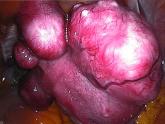VANCOUVER – Not too long ago, clinicians at McMaster University in Hamilton, Ont., noticed that ulipristal acetate seemed to reduce pelvic pain in women who were taking it to shrink fibroids and reduce bleeding and other symptoms.
Fibroids aren’t usually painful, however, so they had a hunch it was helping with pain from other causes and decided to take a closer look.
They reviewed their records and found 18 women who formally rated their pain before and while on ulipristal acetate. The drug is a selective progesterone receptor modulator approved in Canada for fibroid treatment (Fibristal) and in the United States as prescription-only emergency contraception (Ella). Allergan, the drug’s maker, plans to submit an application to the U.S. Food and Drug Administration for fibroid treatment.All of the women at McMaster started out with moderate to severe pelvic pain, but ,while on the drug, nine (50%) said they had less pain, and seven (39%) said they had no pain at all. Most of the women reduced or stopped other pain medications.
Ten of the women had surgery, generally for fibroid control, and nine turned out to have endometriosis, adenomyosis, or both. The women were 25-49 years old and took the drug per Canadian fibroid labeling – 5 mg daily for 3 months.
“I was surprised by how many women actually had an improvement in their pain and how many went down to zero,” said lead investigator Sarah Scattolon, MD, a minimally invasive gynecologic surgery fellow at McMaster. Almost all of the women “had used multiple treatments in the past that didn’t work, including opioids. That makes a placebo effect less likely.”
The need for better endometriosis treatments was a frequent topic at the World Congress on Endometriosis, where Dr. Scattolon presented the study findings. Gonadotropin-releasing hormone agonists, progestins, and other options can help, but they don’t work for everyone, and some women can’t tolerate the side effects.
The idea that ulipristal acetate and other selective progesterone receptor modulators might be useful additions to the armamentarium has been around for a while, but there’s not much research. Dr. Scattolon said her next step is a prospective study among women with pelvic pain and, ultimately, a randomized trial. A small prospective study is already underway at Northwestern University, Chicago, for pelvic pain associated with endometriosis.
It’s unclear how the drug helps pelvic pain. It suppresses ovulation, which might help women with pain related to menstruation. “It presumably works in a different way” than other anovulatory options, Dr. Scattolon said.
Hot flashes and headaches are the most common adverse reactions, but Allergan’s Canadian Fibristal monograph states that side effects are mild or moderate and do not often lead to discontinuation.
Allergan wasn’t involved in the study, but Dr. Scattolon was scheduled to give her first paid talk for the company.
aotto@frontlinemedcom.com
